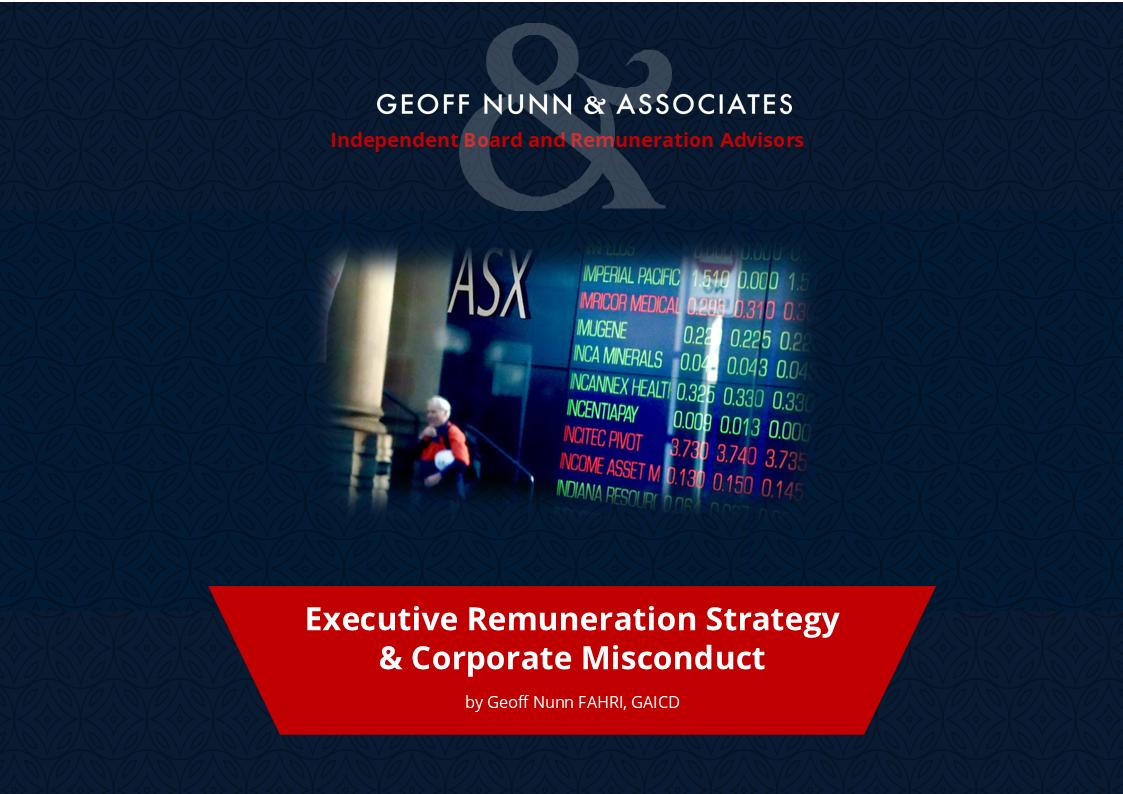
Governance Commentary
Exploring the Issues
Disclaimer: the comments and opinions expressed on this page are the personal views of the author, Geoff Nunn, and do not represent professional advice.
Report Findings: We found, not surprisingly, that equity based variable reward, driven largely by financial metrics, continues to constitute a large proportion of the remuneration package of most CEOs in this group. The prevailing message continues to be about aligning the financial interests of executives with those of shareholders. Recent inquiries have found that other stakeholders have not fared so well in terms of corporate focus.
We’ll continue to monitor developments in executive remuneration and the links with corporate conduct and performance.
Executive Remuneration Continues to be a Core Governance Issue
The structure and quantum of executive remuneration continues to be a core issue for boards and remuneration committees across Australia. The challenge is to find balance in a competitive market. Shareholder returns remain front and centre for directors of listed companies. Yet somehow the framework needs to serve the interests of all stakeholders.
In the attached research report we’ve looked at the 2024 CEO remuneration packages of 12 of our top listed companies. We’ve chosen companies that have a customer facing retail presence in the Australian market and therefore direct end-user impact.

The Governance Conundrum
Compliance Overload
In Australia the compliance demands on directors are extraordinary. The array of legislative and regulatory requirements has grown exponentially over the last decade. Just consider the impact of the 2018 Banking Royal Commission and the subsequent APRA CPS 511 regulating executive remuneration. Another impost on the banks and other financial institutions which does little to enhance customer experience. It was a regulatory requirement entirely of the bank’s own making.
Sometimes the regimented nature of board meetings gets in the way of strategic thinking and innovation. Whilst accepting that a level of formality is required, flexibility might also be appropriate in some instances.
If governments are serious about boosting the productivity and sustainability in both the public sector and our private sector, then compliance requirements need to be reduced. This issue featured on the Treasurer’s Roundtable in August 2025 with industry groups calling for a significant reduction in compliance requirements. In return boards, CEOs and executive leadership teams need to lift their game and ensure that all their activities are guided by a real commitment to ESG principles.
Core governance issues:
-

Reputation is Everything
Some analysts maintain that reputation accounts for between 40% and 60% of a company’s value. Once lost it is very hard to re-build. Just consider the recent episode with Australia’s corporate icon, Qantas, which trashed it’s brand through a raft of ill conceived survival strategies during the pandemic.
Our major retailers are looking a bit shaky at the moment. The long awaited ACCC report into the pricing and competitive practices found there is little incentive for the majors to compete on price.
The 2025 Edeleman Barometer showed that 51% of Australians do not trust corporations, governments, the media and NGOs. A sorry state of affairs.
Boards, non-executive directors and CEOs need to ensure that Reputation Risk is front and centre for the Audit and Risk Committee.
-

Executive Remuneration: A Quantum Dilemma
Toward the end of 2024 a gasp was heard around the world when the Board of Tesla proposed to honour contractual arrangements with its CEO via a US $56 billion remuneration package. The deal was overturned by a Delaware court and is under appeal.
Fortunately we don’t see figures like that in Australia. Nevertheless the quantum and structure of executive remuneration in our major corporates has been a concern for governments, regulators, investors and the public for some time.
The use of equity based incentives schemes has increased exponentially over the last 25 year. The prevailing rhetoric has been about aligning the financial interests of executives with shareholders. Unfortunately other stakeholders have not fared so well as multiple inquiries have found corporate misconduct to be widespread.
-

ESG Principles Need to Guide All Decisions
Environment, Social and Governance (ESG) has been the latest in a series of acronyms inviting companies and governments to lift their game when it comes to ethical and socially responsible conduct. Regulators and stakeholders have been calling on boards to take a balanced perspective and not simply pursue shareholder returns regardless of the consequences.
Over the past few years I’ve had the good fortune to serve on a number of NFP boards. The dedication and commitment of NED’s in these organisations has been quite extraordinary. They take a multi-stakeholder perspective and often contribute above and beyond.
Equanimity and breadth of focus is essential for NEDs in all organisations.
-

CEO Succession
Perhaps the greatest challenge any board faces is finding the right CEO. Poor selection can have devastating consequences. We can all remember cases across the Australian corporate landscape of dramatic failures. But mostly boards get it right and here are a few hints from those that do:
a) If you are using a search consultant check out reputation before choosing which firm to use. Cost is only one factor to consider.
b) Make sure you know who’s who in your sector. The good CEOs stand out and have industry presence.
c) Focus on specifying the job accurately. Include the capacity to fit with your governance approach, industry outlook, integrity and capacity to lead in disrupted times.
d) Choose your selection panel carefully. Include an independent or two as this will broaden the perspective.
e) Be prepared to dig deep for the right person. They know their worth.
Here are some useful guidelines from the AICD: https://www.aicd.com.au/finance-governance/australian-accounting-standards/ias/selecting-a-ceo.html
-

Managing AI Deployment
“The technological singularity—or simply the singularity —is a hypothetical future point in time at which technological growth becomes uncontrollable and irreversible, resulting in unforeseeable changes to human civilization. According to the most popular version of the singularity hypothesis, I.J. Good's intelligence explosion model, an upgradable intelligent agent will eventually enter a "runaway reaction" of self-improvement cycles, each new and more intelligent generation appearing more and more rapidly, causing an "explosion" in intelligence and resulting in a powerful superintelligence that qualitatively far surpasses all human intelligence.” https://en.wikipedia.org/wiki/Technological_singularity
Arguably we are there already. If not it’s just around the corner. In a brilliant ABC article on 24 March 2025, Alan Kohler warned that we are plunging blindly towards an AI revolution that could collapse human society. Microsoft has teamed up with “inait” (The Open Brain Institute) to commercialise the first digital brain. It’s smarter than we are.
AI has the potential to benefit humankind in many ways. Boards and CEOs need to be vigilant and ensure human centred values and a commitment to ESG principles guide their policy decisions. The technology is there to serve organisations and their stakeholders. Not the other way around.
-

Disruption and Risk
The impact of various global geopolitical changes in 2025 has plunged the world into a period of great disruption. Not only has the threat to the environment increased exponentially, but the very foundations of democracy and the rules based order are being challenged. All boards and audit and risk committees need to confront these new challenges and ensure they have the right strategy and risk executives in place to advise on strategy. Some of the most challenging risks are:
1. Sovereign Risk: the risk that governments (around the world) may take actions that imperil a successful business operating model.
2. Diversity Risk: We’ve heard about some. companies abandoning diversity, equity and inclusion policies in favour of strictly merit based appointments. This is a sound approach provided we make space in our major organisations for those who might be regarded as diverse.
3. AI/Cyber Risk: Every day we hear about data breaches including the bank and super account. It has never been more important to have the best cyber security team and to deploy AI with integrity.
4. Compliance Overload: Australia is one of the most regulated countries in the world. Every time a case of misconduct occurs another round of regulations emerge. Sound governance helps to minimise this risk.

“Right now we need to take stock and not simply follow the lead from other countries who may have a less compassionate ethos than our own. We need to foster education for all, support our institutions to be diverse and inclusive, encourage research and development, and perhaps most of all, place the community at the centre of our focus.”
Geoff Nunn, Governance Update, February 2025

